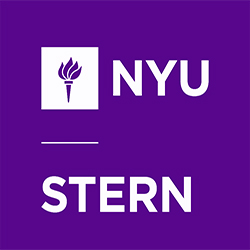 Gustavo Valverde Rezende is an MBA2, originally from Brazil. He has a Bachelor’s in business administration from Universidade Federal de Juiz de Fora and a Master’s in finance from IBMEC. Before joining Stern, Gustavo worked in management consulting, public management, and corporate finance before joining Eureca, a purpose-driven startup, as Chief Financial Officer. His latest job was as Strategy & Finance Leader at Grupo Anga, Eureca’s parent company, overlooking a portfolio of six purpose-driven companies. This summer, Gustavo worked as an Investment Banking Summer Associate at Credit Suisse in New York.
Gustavo Valverde Rezende is an MBA2, originally from Brazil. He has a Bachelor’s in business administration from Universidade Federal de Juiz de Fora and a Master’s in finance from IBMEC. Before joining Stern, Gustavo worked in management consulting, public management, and corporate finance before joining Eureca, a purpose-driven startup, as Chief Financial Officer. His latest job was as Strategy & Finance Leader at Grupo Anga, Eureca’s parent company, overlooking a portfolio of six purpose-driven companies. This summer, Gustavo worked as an Investment Banking Summer Associate at Credit Suisse in New York.
Before coming to NYC, I never cared too much about academics. After a few weeks in my first year at Stern, I realized it would be a mistake not to care. As I studied Statistics, Accounting, Foundations of Finance, Strategy, and Firms & Markets, – all courses I had taken before – I felt like I was exploring a whole new world. Now, in my second to last semester, I already miss the academic experience at Stern.
What made me change my mind so drastically and quickly?
1. Stern classes are relevant to me
As they will be to you. Note I didn’t write that they are important for a business professional – I chose my words carefully. After a few years of work experience, I have a pretty strong sense of things I like to do and, more importantly, areas where I need to improve. Stern has over 200 elective classes that allow me to tailor my professional experience to what I like and need.
Even with core classes, like the ones I mentioned before, I had the option to opt out based on my previous experience – but chose to take them anyway because I believed that would strengthen my fundamentals, as they did. I also took classes such as Modeling Financial Statements, which aligns with what I want to do in the future, and Management Communications, which is something I’m sure I need to improve upon. These are two of my favorite classes – but I’ll get back to them.
To help me avoid a choice paradox, Stern offers 27 specializations that cluster all these electives together. I’m not required to choose any particular specialization, but they are very helpful for my own academic planning. They are also nice signals to send to recruiters or the market about topics you care about enough to specialize in. So I can pick up to three specializations, or none. Whatever works best for me. I chose to specialize in Corporate Finance, General Management, and Banking because these align with my short and long-term career goals.
2. Stern professors care about what you take from their classes
I like to think that my teachers are as diverse as my classmates. Each of them has their own teaching methods, backgrounds, and styles. Some are researchers, some are practitioners. But I like to think they all have one thing in common: they give you tough love.
Believe me, they can be tough! In Modeling Financial Statements, Professor Dan Gode gave us over 100 assignments in one semester. In Management Communication, Professor Burns held an in-class exercise where she played the part of an obnoxious CEO that made me wanna quit (her company, not her class!).
Professors at Stern do this because they believe that’s the best way for you to take something from their class. And they have the freedom to do so. I would have never gotten through my internship without the practice runs Professor Gode gave me last Spring. It was hard, but I left that class much better prepared for life. Professor Burns took me out of my comfort zone to teach me how to handle difficult people in power positions. She did not need to do this, but she did. And it was invaluable.
3. Stern academics don’t end in the classroom
At Stern, I can learn in several different ways. I can travel abroad for an exchange program in Europe, LATAM, Asia, and many other places. I can spend a week learning about business in South Africa or Argentina. I’m gaining real-world experience through my involvement in a student-led fund seeking to invest in impactful startups. I could also gain experience on a non-profit Board, deliver a consulting engagement, or engage with an early-stage tech startup in NYC.
This allows me to really learn from my peers and form my own experience. I learn as I do, or do as I learn, just like it should be.
The bad news is that I won’t be able to do everything I wanted. Two years may sound like a lot, but most of the time it feels like it’s not enough. There’s just not enough time to take classes with all Professors I’d like to learn from, nor to take all the experiential offerings I’d like to live. Prioritizing is an arduous and constant struggle. FOMO is real at Stern. Even in academics, believe it or not.
And I’m glad it is. Because this variety of options is what makes my Stern experience unique. It’s what makes NYU Stern a good fit for me. And hopefully, for you.
